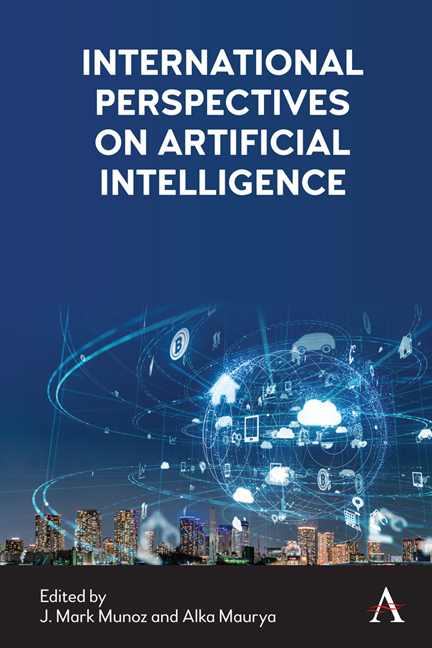Book contents
- Frontmatter
- Contents
- List of Illustrations
- List of Contributors
- Chapter 1 Introduction
- Chapter 2 Artificial Intelligence in the United States
- Chapter 3 Artificial Intelligence in Canada
- Chapter 4 The Mad Max Interceptor Experience in the UK: Artificial Intelligence in Mortgages
- Chapter 5 Artificial Intelligence in Germany: Strategy and Policy—the Impact of AI on German Economy
- Chapter 6 Japan's ‘Artificial-Intelligence Hospital’ Project: Can It Help the Ageing Population?
- Chapter 7 Artificial Intelligence in the Middle East European Countries
- Chapter 8 A Million Products for a Billion People: Artificial Intelligence in Consumer Industries in India
- Chapter 9 “All-In AI”: What is Compelling Companies in China to Bet the House on Artificial Intelligence?
- Chapter 10 Artificial Intelligence Research in Russia: Recovering from the Polar Winter
- Chapter 11 The Fourth Industrial Revolution in Africa
- Chapter 12 The Adoption of Artificial Intelligence within the Caribbean: Resuscitating the CARICOM's Single Market and Economy
- Chapter 13 Has Australia Been Late in Addressing the Artificial Intelligence Challenges?
- Chapter 14 Conclusion
- Index
Chapter 14 - Conclusion
Published online by Cambridge University Press: 02 March 2022
- Frontmatter
- Contents
- List of Illustrations
- List of Contributors
- Chapter 1 Introduction
- Chapter 2 Artificial Intelligence in the United States
- Chapter 3 Artificial Intelligence in Canada
- Chapter 4 The Mad Max Interceptor Experience in the UK: Artificial Intelligence in Mortgages
- Chapter 5 Artificial Intelligence in Germany: Strategy and Policy—the Impact of AI on German Economy
- Chapter 6 Japan's ‘Artificial-Intelligence Hospital’ Project: Can It Help the Ageing Population?
- Chapter 7 Artificial Intelligence in the Middle East European Countries
- Chapter 8 A Million Products for a Billion People: Artificial Intelligence in Consumer Industries in India
- Chapter 9 “All-In AI”: What is Compelling Companies in China to Bet the House on Artificial Intelligence?
- Chapter 10 Artificial Intelligence Research in Russia: Recovering from the Polar Winter
- Chapter 11 The Fourth Industrial Revolution in Africa
- Chapter 12 The Adoption of Artificial Intelligence within the Caribbean: Resuscitating the CARICOM's Single Market and Economy
- Chapter 13 Has Australia Been Late in Addressing the Artificial Intelligence Challenges?
- Chapter 14 Conclusion
- Index
Summary
The chapters in this book highlight the fact that AI is alive and well in many corners of the world. It is evident that in diverse shapes and forms, AI is having an impact on businesses, governments, economies and lives of people worldwide.
From the chapters, five key themes are notable with regard to the international practice of AI:
Common appeal – it is evident that countries in different parts of the world find AI appealing and are using it to advance operational efficiencies.
Diversity of application – while there is common interest in AI worldwide, countries and companies differ with regard to what they view as priorities or essential to their operations.
Lack of cooperation – it appears that AI is used and applied in different locations in silos and there is not much cross-country collaboration seen.
Economic importance – from the modalities in which AI is applied, it is evident that the practice of AI translates into a significant economic impact.
Technological reliance – the success of AI applications in countries is dependent on the technological infrastructure, resources and talent available in the location.
These themes suggest the following:
1. AI impacts a nation's competitiveness– countries that invest in AI and have the technological framework to implement and advance AI would gain a competitive edge.
2. Cross-country cooperation can bolster AI competencies – since country infrastructure and resources are uneven, the sharing of resources can lead to mutual benefits.
3. Advancement in AI in countries impacts corporate performance and lives of the citizenry – a country with a well-developed AI architecture provides essential support for corporations as well as government organizations, which in turn improves the lives of its citizenry.
In light of the above, the authors suggest the following courses of actions for governments, corporations, and executives and entrepreneurs.
Governments
Table 14.1 outlines important strategic considerations for governments.
These strategies underscore the fact that gaining advantages in AI does not happen by accident. For governments to optimize the economic benefits relating to AI, careful planning and well-conceived supporting investments are necessary.
Corporations
Table 14.2 outlines important strategic considerations for corporations.
These strategies suggest that corporations need to think in new ways. They need to aspire to be ‘cognitive leaders’ in their field.
- Type
- Chapter
- Information
- International Perspectives on Artificial Intelligence , pp. 127 - 130Publisher: Anthem PressPrint publication year: 2022

